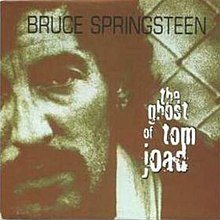The Ghost of Tom Joad (song)
| "The Ghost of Tom Joad" | |
|---|---|
 |
|
| Single by Bruce Springsteen | |
| from the album The Ghost of Tom Joad | |
| Released | November 21, 1995 |
| Recorded | April–June 1995 at Thrill Hill West in Los Angeles |
| Genre | Folk rock |
| Length | 4:23 |
| Label | Columbia |
| Writer(s) | Bruce Springsteen |
| Producer(s) | Bruce Springsteen, Chuck Plotkin |
| "The Ghost of Tom Joad" | ||||
|---|---|---|---|---|
 |
||||
| Single by Rage Against the Machine | ||||
| from the album Rage Against the Machine (1997 video) and Renegades | ||||
| Released | 25th November 1997 | |||
| Format | CD, 7", 12" | |||
| Genre | Rap metal, alternative metal | |||
| Length | 5 min 38 s | |||
| Writer(s) | Bruce Springsteen | |||
| Rage Against the Machine singles chronology | ||||
|
||||
"The Ghost of Tom Joad" is a folk rock song written by Bruce Springsteen. It is the title track to his eleventh studio album, released in 1995. The character Tom Joad, from John Steinbeck's classic 1939 novel The Grapes of Wrath, is mentioned in the title and narrative. Originally a quiet folk song, "The Ghost of Tom Joad" has also been recorded by Rage Against the Machine. Springsteen himself has performed the song in a variety of arrangements, including with the E Street Band, and a live recording featuring Rage Against the Machine's Tom Morello as guest. In 2013, Springsteen subsequently re-recorded the track with Morello for his eighteenth studio album, High Hopes (2014).
Besides The Grapes of Wrath, the song also takes inspiration from "The Ballad of Tom Joad" by Woody Guthrie, which in turn was inspired by John Ford's film adaptation of Steinbeck's novel. Springsteen had in fact read the book, watched the film, and listened to the song, before writing "The Ghost of Tom Joad", and the result was viewed as being true to Guthrie's tradition. Springsteen identified with 1930s-style social activism, and sought to give voice to the invisible and unheard, the destitute and the disenfranchised. His use of characterization was similarly influenced by Steinbeck and Ford.
However, like the rest of the album, "The Ghost of Tom Joad" is set in the early-to-mid-1990s, with contemporary times being likened to Dust Bowl images:
President George H. W. Bush's New world order gains ironic mention, as is the contemporary demographic migration to the Southwest United States. The chorus makes clear the titular allusion:
...
Wikipedia
